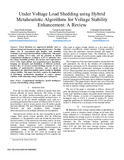| dc.description.abstract | Power blackouts are experienced globally, more so with increasing load demand and ageing infrastructure. The high failure rate of conventional and adaptive load shedding
techniques is prevalent during multiple contingencies. This paper analyses existing UVLS tools, and the potential of hybrid computational intelligence techniques (CIT) to optimally solve the voltage instability problem. Researchers have implemented UVLS with single-solution and population-based algorithms, bringing out strengths and limitations of different methods. Features like: (1) accuracy in load shedding amount, (2) ease of
handling of multi-objective functions, and (3) speed of convergence are desired in modern power systems to maintain voltage stability. This paper, therefore, explores the implication
of hybridizing metaheuristic algorithms to achieve optimal solutions, while enhancing voltage stability post-contingency. | en_US |

